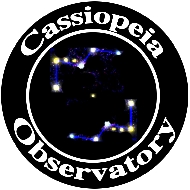Supernova 2017ein in Galaxy NGC3938,
Near Earth Object 2017 CS
Posted: 2 June 2017
Cloudy skies returned on Monday, 29 May 2017, and continued on Thursday, 1 June. Thursday night I attended the monthly meeting of the Oracle Dark Skies Committee. When I returned home from the meeting the sky was clear!
|
Open: Thursday, 1 June 2017, 2106 MST Temperature: 78°F |
Session: 1117 Conditions: Clear |
Equipment Used:
12" f/8 LX600 w/StarLock
2" 24mm UWA eyepiece
Camera:
iPhone 6s Plus
D7200 DSLR
2115 MST: LX600 ON, StarLock OFF, High Precision OFF.
2117 MST: viewed the near First Quarter Moon, 102X. Took this handheld iPhone 6s Plus afocal 102X photo:

2121 MST: viewed Jupiter and four moon, 102X.
Then began preparing to image the recently discovered supernova 2017ein in the galaxy NGC3938. 2130 MST: slewed the 12" telescope to NGC3938. The galaxy was faintly visible, 102X, but the view was hampered by the nearby bright Moon. The supernova was not visible to the eye. Then mounted the D7200 DSLR at prime focus + focal reducer, focused on the star Regulus, and locked the primary mirror.
2138 MST: StarLock ON. This is a StarLock autoguided, 5 minutes, ISO 6400, White Balance 3570K, black-n-white image of NGC3938 and SN 2017ein:

Mouseover or tap on image for label
Then focused on the star Vega and SYNCed the AutoStar on Vega. 2215 MST: Wi-Fi ON. Used SkySafari 5 Pro on the iPhone to GOTO Near Earth Object (NEO) asteroid 2017 CS. This is a StarLock autoguided, 1 minute, ISO 6400, WB 3570K image of NEO 2017 CS with the Magnitude +15.38 galaxy PGC61283 below it:

Mouseover or tap on image for label
I then took some 10 seconds, ISO 12800, WB 3570K images of NEO 2017 CS at one minute intevals for this animation showing the rapid movement of the NEO:

2226 MST: ended imaging. StarLock OFF. Removed camera. Tried to observe NEO 2017 CS but it was too faint and the sky background too bright due to the Moon.
2253 MST: Wi-Fi OFF. Viewed Saturn, 102X. Seeing was not good. Then took a final look at Jupiter, 102X. Only three moons were visible.
|
Close: Thursday, 1 June 2017, 2311 MST Temperature: 68°F |
Session Length: 2h 05m Conditions: Clear |
Comments are welcome using Email. Twitter users can use the button below to tweet this report to your followers. Thanks.
Cassiopeia Observatory Home Page
Copyright ©2017 Michael L. Weasner / mweasner@me.com
URL = http://www.weasner.com/co/Reports/2017/06/02/index.html
